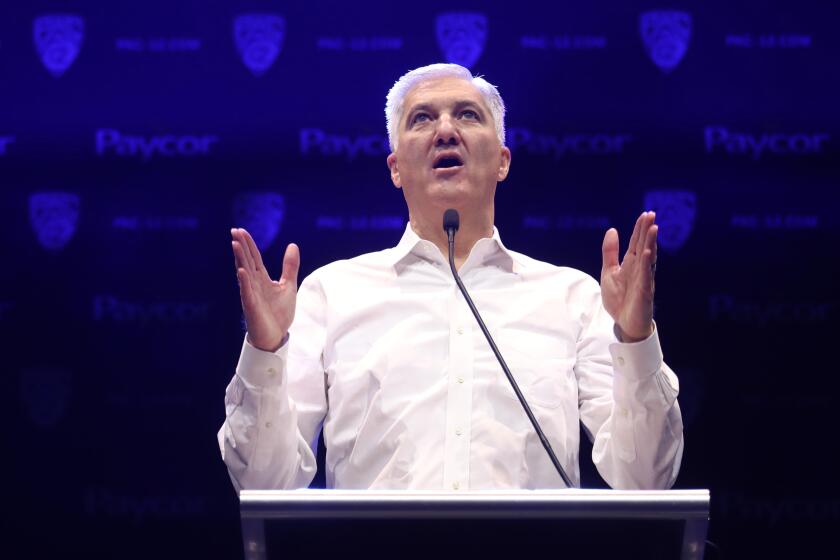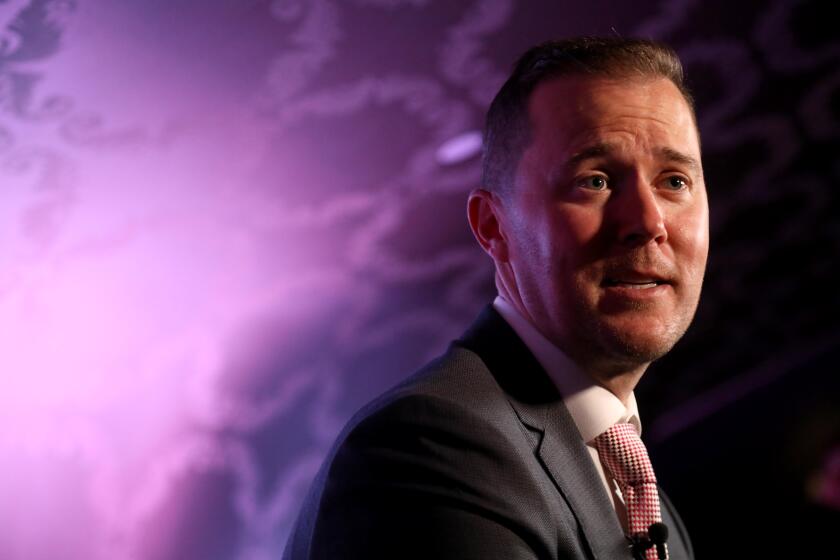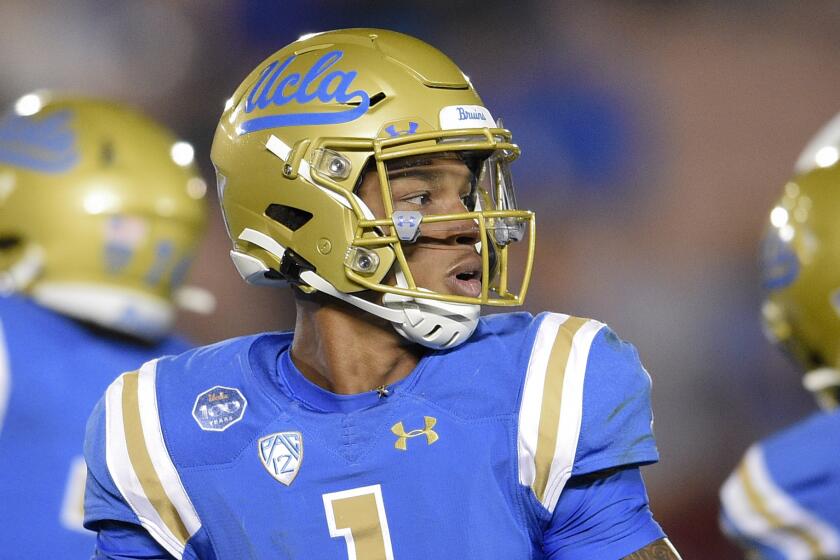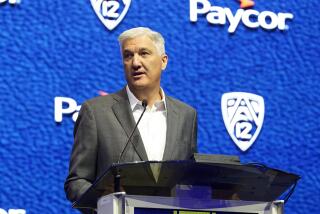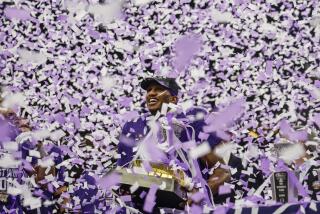USC President Carol Folt ‘shut down’ potential Pac-12 expansion plans last year
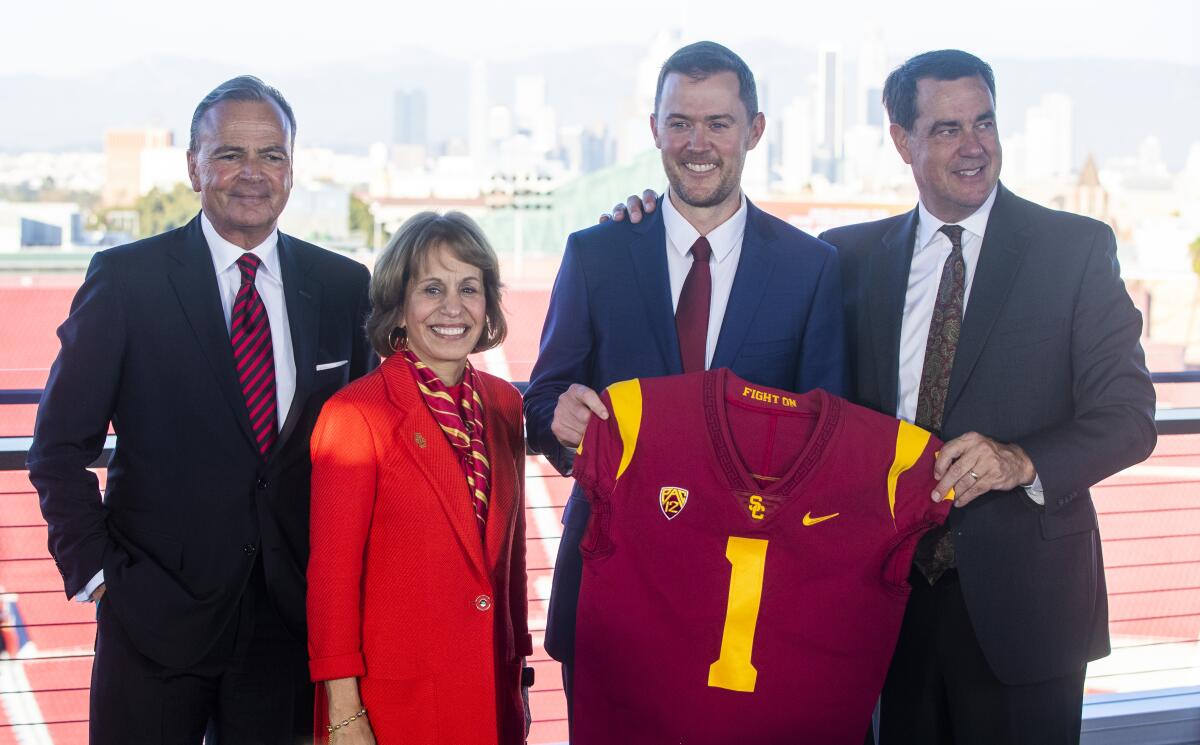
- Share via
Late last summer, opportunity knocked on the Pac-12’s door. Texas and Oklahoma were off to the Southeastern Conference, leaving the leftover Big 12 schools in the dust with no other choice but to gaze westward for what appeared to be an increasingly safe “Power Five” conference home.
Sure, the Pac-12’s football product had been down for a decade-plus, in large part because of USC’s decline. But the Trojans still represented a blue blood, flagship program located in the nation’s No. 2 media market. As it was for Texas and Oklahoma in the Big 12, USC’s rooted presence equated to stability. And, in the formation of college sports conferences, such a tide can raise all boats.
First-year Pac-12 Commissioner George Kliavkoff was fielding calls from desperate Big 12 schools and had zeroed in on a few that he felt added enough value to strongly consider expanding the Pac-12 footprint into America’s Great Plains.
Kliavkoff assembled a committee of three presidents and three athletic directors to decide whether or not to recommend expansion to the larger group. The group met on a Zoom call to go over a 20-slide deck. But the Pac-12 was only about 15 minutes into its hourlong presentation before USC President Carol Folt spoke up.
What does the Pac-12 commissioner think about USC and UCLA leaving the conference for the Big Ten?
Folt told the group that she did not understand why the Pac-12 would expand and expressed surprise they were even talking about it, according to multiple sources who were familiar with the call but not authorized to speak publicly because of the sensitivity of the subject.
“Carol shut it down,” one source said.
“She cooled the whole process,” another source said.
In late August, the Pac-12 announced it would not expand.
Ten months later on June 30, USC and UCLA announced they were leaving the Pac-12 for the Big Ten starting in August 2024, continuing college football’s movement toward two superpower conferences that Texas, Oklahoma and the SEC began the previous summer.
Now that USC and UCLA are headed for the Chicago-based Big Ten, Stanford, Washington and Oregon have been reported to be among the next wave of Big Ten targets after priority Notre Dame, placing the Pac-12 in further peril.
Meanwhile the Big 12, which banded together as the remaining eight schools added four new members, appears poised to poach any Pac-12 schools with a wandering eye.
The Pac-12 could have added top Big 12 schools last summer, positioning itself as one of the top four conferences regardless of the L.A. schools’ long-term intentions. Instead, USC’s negative response combined with its escape to the Big Ten a year later, has put the Pac-12 in a precarious spot.
“We’re not going to respond to anonymous comments or hearsay,” Folt said in a statement to The Los Angeles Times.
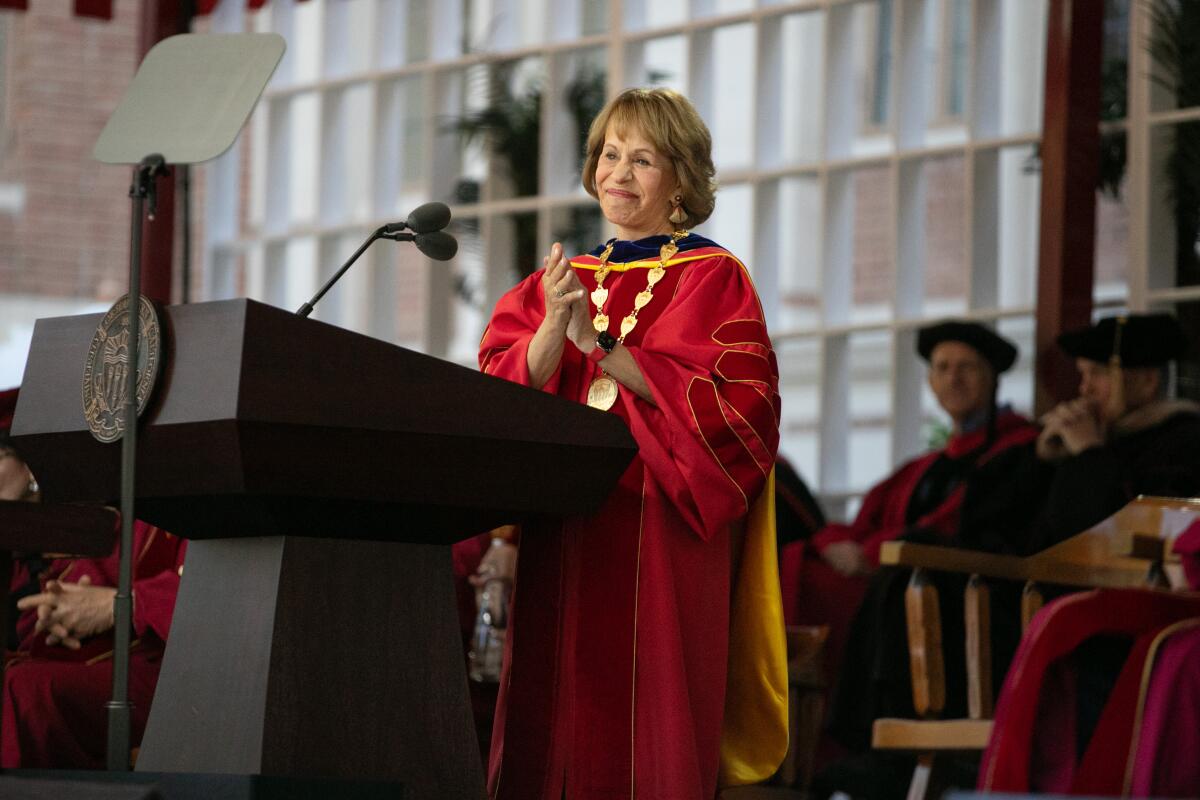
At the time, there were clear reasons USC would not want to expand. Within the Pac-12, USC’s leaders weren’t alone in expressing such reservations. Adding members would mean dividing the Pac-12’s already frustratingly small revenue pot among more hands. And, considering USC had not yet been invited to the College Football Playoff, adding more competition within its own conference would only make it harder to accomplish that elusive goal.
At Pac-12 media day Friday, Kliavkoff recalled he was vacationing in Montana with his family on that surreal Thursday morning when he got an urgent text message from a Pac-12 official. Driving in Idaho, he found a place with cellphone reception and pulled over. He quickly turned the car around, feeling blindsided by the news that his Los Angeles linchpins had betrayed their near-century-old relationship with the league and its peer institutions.
Not even a year into his tenure as Pac-12 Commissioner, Kliavkoff didn’t have much time to make his premier program happier. He was certainly in the process of trying. Removing the division tie-in to the league’s championship game would definitely help USC. But now the Trojans were gone, without any warning, as Kliavkoff was given no indication of the Trojans’ wanderlust.
USC coach Lincoln Riley responded publicly Friday to Pittsburgh coach Pat Narduzzi accusing him of tampering in receiver Jordan Addison joining the Trojans.
USC coach Lincoln Riley said Friday the school’s openness to evaluating its future conference affiliation was discussed with him before he took the job in late November.
“I had a little bit of a heads up with it,” Riley said. “We had conversations when I took the job, not specifically about the Big Ten, not about an imminent move, but we knew we were going to have to monitor the landscape of what’s going on. You have to be on the forefront, and so I’m glad our people were progressive enough to seize what I think is going to be a great opportunity. I certainly understand the reasons behind it and fully support it.”
A year after the Pac-12 could have seized the moment by expanding leading into its upcoming media rights negotiations — the league could have added Texas Christian, for instance, to add the Dallas-Fort Worth media market to its offerings — Kliavkoff is now fighting for his league’s future from a much less advantageous position.
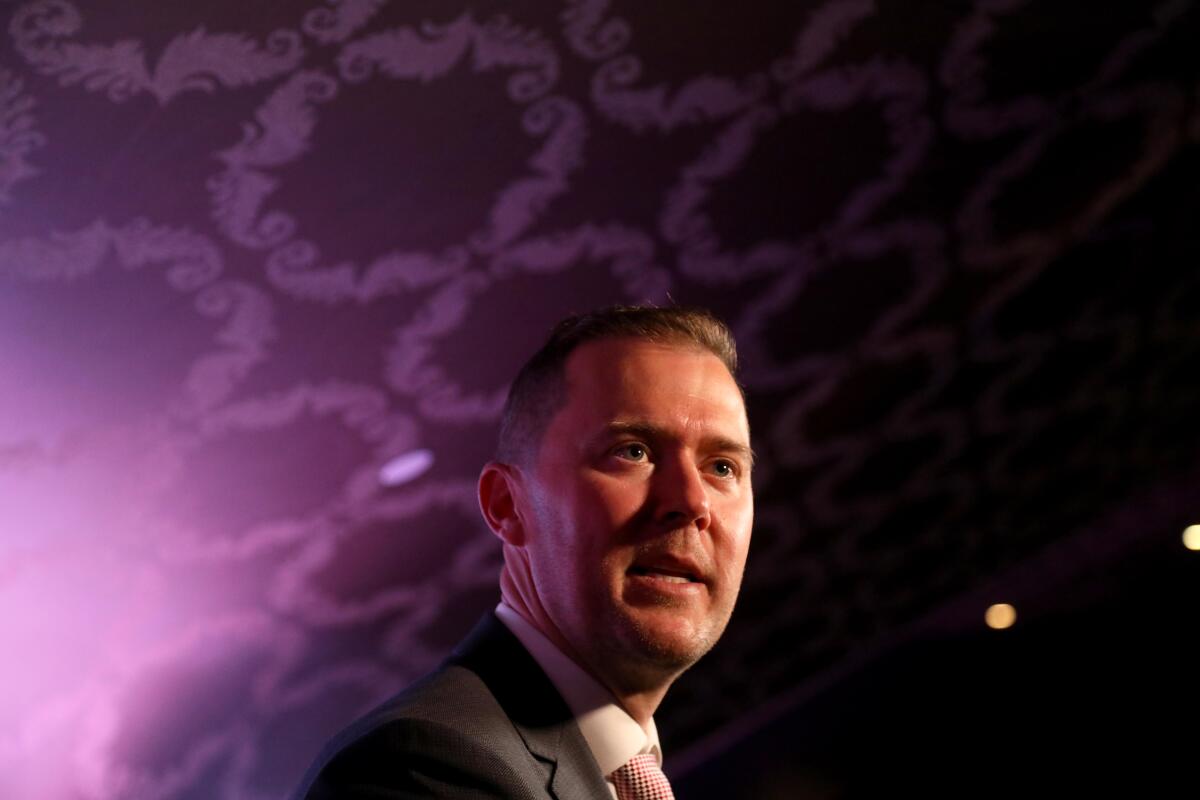
Asked Friday at his news conference whether USC “misled” him, Kliavkoff said, “I’m not going to talk about that. We’re going to take the high road and not talk about what happened in the past.”
Kliavkoff said the last month has been a “whirlwind.”
“We’ve had two board meetings a week for the last four weeks,” Kliavkoff said. “Looking my colleagues in the eye, understanding their commitment, that their first priority is making sure that the Pac-12 survives, thrives and grows and is successful. They’re committed to the conference. I think the best thing to do is to ask them about it.”
The natural follow-up given recent events: Why would Kliavkoff — or anyone in college athletics, for that matter — trust anybody else?
Later Friday morning, Oregon athletic director Rob Mullens spoke with a group of reporters about his school’s situation. Oregon is the Pac-12’s top remaining football brand and is presumed to be coveting a spot in the Big Ten. But, without an invite in hand, the Ducks have no choice but to stick it out with the Pac-12 and make the best of it.
“Your initial reaction is one of personal emotion and what it means for your league and for my school,” Mullens said, “but at the end of the day, what else were [USC and UCLA] supposed to do? They’re in a difficult position too. I try to step back from it.”
Under Armour will pay UCLA $67.491 million to settle the school’s lawsuit against the sports apparel giant, which terminated a 15-year, $280-million deal.
It was a media day unlike any other in Pac-12 history. The event, ironically, was held at the Novo Theater in downtown L.A., and yet, USC athletic director Mike Bohn and UCLA athletic director Martin Jarmond were absent for their customary appearances to support their football coaches and players just miles from their campuses.
For the next two years, the Pac-12 presidents and athletic directors and coaches will be dividing their meetings into two parts — one that the Trojans and Bruins can be privy to and one that they are now barred from joining because of a conflict of interest.
Kliavkoff tried to “take the high road” Friday in his prepared remarks about USC and UCLA, expressing his disappointment but saying “we cherish our relationship with their student-athletes, coaches, staff, faculty, alumni and fans.”
But, listening to him lay out his displeasure with college athletics’ prioritization of money over athlete welfare, one didn’t have to wonder where he was pointing his finger in judgment.
“We should be measuring ... our ability to provide the highest level of athletic competition to our student-athletes without unnecessary travel, time demands and other burdens on competition impeding their academic success,” Kliavkoff said.
“We are at a critical juncture and the decisions we make in the near future will determine whether we head towards a world in which a small handful of conferences are playing professional sports at the expense of tens of thousands of academic opportunities.”
More to Read
Go beyond the scoreboard
Get the latest on L.A.'s teams in the daily Sports Report newsletter.
You may occasionally receive promotional content from the Los Angeles Times.


